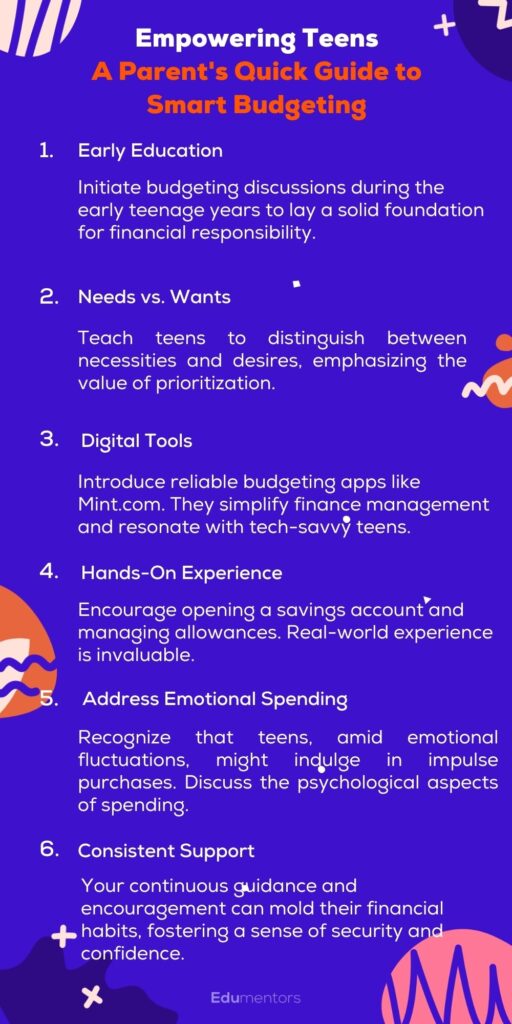Teaching Teens Budgeting Money-Saving Tips for Parents
In today’s world, where financial decisions are becoming increasingly complex and crucial, the gift of financial literacy is invaluable. It’s more than just numbers and accounts; it’s a comprehensive understanding of how to make those pounds, dollars, or euros work for you and your family. For parents, the often-debated question is when should we introduce our teens to budgeting tips and the principles of saving?
Financial experts across the UK echo the sentiment of starting early. With rising living costs and economic uncertainties, being armed with personal budgeting tips and knowledge from a young age can make a marked difference. The teenage years, marked by growth, curiosity, and development, are a pivotal time. Given the emotional fluctuations and instability often associated with teen mental health, it’s not uncommon for them to make impulsive purchases without considering the consequences. This phase, where they are transitioning from childhood to adulthood, is ripe for instilling the best budgeting tips for beginners. When they start their journey equipped with money-saving and budgeting tips, they are more likely to make informed decisions, providing a safety net against their emotional spending habits and avoiding common financial pitfalls.
Parents play a pivotal role in this journey. By sharing effective budgeting and savings tips, not only do we prepare them for their future, but we also impart life skills that transcend beyond just finance. The earlier you embark on this journey of financial enlightenment with your teen, the more secure and confident they will be in navigating the often tumultuous waters of adulthood finances. So, let’s dive deep and explore how we, as guardians of their future, can ensure they step into the world with their best financial foot forward.

Why Teens Should Start Saving Now
The long-Term benefits of starting young
Starting early has always been a mantra echoed by financial experts, and it’s not just a catchy phrase; it’s grounded in practicality. One of the most tangible advantages of starting young is the power of compound interest. By understanding this and introducing teens to simple budgeting tips, they can begin to see their savings grow exponentially over time. It’s not just about the immediate savings but the accumulation over the years.
Moreover, as the economic landscape shifts, with fluctuating job markets and rising living costs, especially in the UK, having a financial cushion can be a significant relief. Introducing budgeting tips UK specific can ensure they’re tailored to our unique economic environment. The earlier teens start saving, the more time they have to adjust, make mistakes, learn, and set themselves up for a robust financial future.
How Saving Habits Can Shape Their Future Financial Decisions
Habits, once formed, can be challenging to break. This fact is especially true for financial habits. By teaching teenagers effective budgeting tips and strategies now, we’re setting a foundation for their entire financial journey ahead. When they’re faced with larger financial decisions in the future, such as purchasing their first car, navigating university expenses, or even planning their first big holiday, they’ll be equipped with the best budgeting tips and practices.
Furthermore, instilling the concepts of the 50 30 20 budget rule or even the 70 20 10 budget rule can provide a structured approach to their finances. It’s not just about saving; it’s about understanding how to allocate funds. This knowledge ensures they can enjoy their earnings, cover necessities, and still save for their future.
Equipped with these skills, they’ll be less likely to fall into common pitfalls like accumulating unnecessary debts or making impulsive financial decisions. They’ll approach their finances with a mindset honed by years of practice, making them more resilient, savvy, and prepared for whatever economic challenges or opportunities lie ahead. For parents, knowing that our teens are not only financially stable but also financially intelligent is one of the most rewarding gifts we can offer.
Understanding the Basics of How to Budget

Budgeting 101 for Teens
Understanding the basics of budgeting is crucial for anyone, let alone a teenager just starting their financial journey. At its core, budgeting is about managing income and expenses effectively, ensuring that spending doesn’t exceed earnings. By introducing budgeting tips for beginners, parents can empower their teens with the knowledge and tools they need to take control of their finances. This is a step towards cultivating financial independence and resilience in an ever-evolving economic climate.
The Difference Between Needs and Wants
Distinguishing between needs and wants is foundational to efficient budgeting. Needs encompass essential expenses like food, shelter, and basic utilities, whereas wants might include entertainment, luxury items, or non-essential purchases. One of the great budgeting tips for teens is to list down their needs and wants on a piece of paper. This visual representation can make it easier for them to prioritise and allocate funds appropriately. Understanding this difference not only enhances their budgeting abilities but also instil a sense of responsibility and discernment when it comes to spending.
Different Methods of Budgeting
There’s no one-size-fits-all approach to budgeting, especially for teens who are still figuring out their preferences and lifestyles. Here’s a quick overview of various methods tailored for teen understanding, along with their pros and cons.
Tracking Method
This involves monitoring and recording every expense. By using budgeting apps or even a simple diary, teens can visualise where their money is going, helping them identify patterns and adjust habits accordingly.
✅ Pros
- Provides detailed insights into spending habits.
- Encourages responsibility and awareness.
- Flexible and adaptable.
❌ Cons
- Requires consistent and regular updating.
- Can be time-consuming.
Envelope Method
An old but gold method, this requires setting aside cash in different envelopes for various expenses, ensuring they don’t overspend in any category.
✅ Pros
- Tangible and visual representation of allocated money.
- Prevents overspending.
- Encourages discipline.
❌ Cons
- Not practical for digital transactions.
- Can be inconvenient to carry multiple envelopes.
- Risk of misplacing cash.
Countdown Method
Ideal for goal-oriented teens, this focuses on saving towards specific targets, counting down until they reach their desired amount.
✅ Pros
- Encourages saving for specific goals.
- Motivating due to a clear end-goal.
- Teaches patience and delayed gratification.
❌ Cons
- Might not cater to unexpected expenses.
- Less flexibility in reallocating funds.
50 30 20 Budget Rule
This rule advises allocating 50% of income to needs, 30% to wants, and the remaining 20% to savings. It’s a simple yet effective way to maintain balance.
✅ Pros
- Easy to understand and implement.
- Ensures a balance between essentials, leisure, and savings.
- Can be tailored to fit various income levels.
❌ Cons
- Fixed percentages might not suit everyone’s circumstances.
- Requires strict adherence for effectiveness.
70 20 10 Budget Rule
A variation of the above, with 70% for needs, 20% for wants, and 10% for investments or savings.
✅ Pros
- Provides more allocation to essential needs.
- Streamlined approach similar to 50 30 20, but with a greater focus on necessities.
❌ Cons
- Might limit the ability to save or invest significantly.
- Like its counterpart, it needs strict adherence.
Discussing these methods and their pros and cons with your teenager can offer them a comprehensive view, helping them choose the one that aligns best with their lifestyle, ensuring they remain engaged and committed to their financial journey.
Practical Steps for Parents
As parents, guiding your teenager into the world of financial responsibility can seem daunting. However, with the right steps and consistent encouragement, you can pave the way for their fiscal success. Here’s how:
Setting Up a Savings Account
One of the fundamental budgeting tips that any financial guide will stress is the importance of a dedicated savings account. For teenagers, this acts as a concrete representation of their savings journey.
Why It’s Important
A separate savings account for teenagers ensures they don’t mingle their everyday expenses with their savings. This distinction promotes financial discipline and helps them understand the value of setting money aside for future needs or goals.
Guiding Your Teen
As a parent, it’s not just about opening an account but teaching them the budgeting and savings tips associated with it. Introduce them to concepts like interest, monitoring their account online, and setting savings milestones. Ensure they are familiar with the budgeting money tips tailored to manage their savings effectively.
Introducing Allowance Management

Allowances can be more than just pocket money. They can be tools to teach financial discipline.
Effective Allocation
Begin with the simple budgeting tips like dividing their allowance into separate portions: savings, necessities, and leisure. The 50 30 20 budget rule or the 70 20 10 budget rule can be a helpful starting point. This introduces them to the idea that not all money is meant for immediate spending.
Encouraging Savings
Stress the significance of setting aside a portion of their allowance for future needs. Over time, they’ll see the benefit, especially as their savings account grows.
Promoting Earning Opportunities
While an allowance is a great way to introduce the concept of money management, there’s no better teacher than the value of hard-earned money.
Earning Their Keep
Encourage your teenager to seek part-time opportunities that align with their interests and schedules. Babysitting, tutoring, or even yard work not only help them earn but also teach responsibility, commitment, and the value of hard work.
The Correlation to Saving
One of the most effective budgeting tips is understanding the value of money. When teens earn it themselves, they’re more likely to think twice before spending frivolously. They comprehend the effort behind each dollar, making them more inclined to save and budget wisely.
By implementing these practical steps and using the right budgeting tips for beginners, parents can effectively prepare their teens for a future of financial independence and smart money decisions.
Apps and Websites for Teen Budgeting
In today’s digital age, teenagers are more tech-savvy than ever. They’ve grown up with smartphones, tablets, and laptops, making them perfectly poised to learn about budgeting through modern means. If you’ve ever wondered, “How do you teach youth about budgeting in a way that’s both engaging and effective?”, then technology is your answer.
With the plethora of budgeting tips and tricks available online, some platforms stand out, especially when it comes to teen-friendly interfaces and functions.
Mint.com
This is one of the best budgeting tips out there in app form. Mint is intuitive and visually appealing, allowing teens to set budgets, track expenses, and even set financial goals. By visualising where their money is going, they can make informed decisions about spending and saving.
Everydollar
Designed for simplicity, Everydollar is all about allocation. Following the principles akin to the 50 30 20 budget rule and the 70 20 10 budget rule, teens can allocate their income (or allowance) to various categories, ensuring they understand the difference between needs, wants, and savings.
Spending Tracker app
As the name suggests, this app is about tracking every penny. It’s a straightforward application where teenagers can manually input their expenditures, teaching them the discipline of noting down every transaction and reflecting on their spending habits.
These digital tools not only make the budgeting process more interactive but also tap into the tech inclinations of today’s youth. They combine the best of budgeting tips for beginners with the engagement levels of modern apps. By introducing your teenager to these platforms, you’re not only teaching them to budget but also ensuring they’re equipped with the money-saving and budgeting tips that will serve them well into adulthood.
Overcoming Common Challenges with Budgeting and Saving Money

Navigating the choppy waters of teenage finances is no simple task. As your child becomes more independent, they’re bound to face challenges that may hinder their budgeting journey. However, with understanding, guidance, and the right budgeting tips, these obstacles can be transformed into teachable moments.
Peer Pressure and Impulse Purchases
One of the significant challenges teenagers face is the tug of peer pressure. In an era where the latest gadgets, fashion trends, and experiences are paraded on social media, saying ‘no’ becomes harder.
Discussing the Impact
Sit down with your teenager and have an open conversation about the implications of giving in to peer influence. Emphasise the importance of distinguishing between short-term satisfaction and long-term financial health. Using personal budgeting tips, demonstrate how yielding to every whim can impact their savings.
Strategies Against Impulsive Spending
Before making a purchase, encourage your teenager to take a moment to reflect. Is it a need or a want? How many hours of work equates to that amount? By creating a tangible correlation between effort, time, and money, teens are more likely to think twice before making impulse buys.
Balancing Fun and Responsibility
Being a teenager is about discovery, adventure, and fun. But it’s also a crucial period for instilling responsibility, especially concerning finances.
Allocating for Fun
Introduce your teenager to tips for budgeting and saving money that allow for entertainment. Whether it’s following the 50 30 20 budget rule or the 70 20 10 budget rule, ensure there’s a dedicated portion for leisure. This way, they won’t feel deprived, and they’ll learn the value of moderation.
Prioritising Spending
Encourage them to list their hobbies and interests. Next, help them allocate their ‘fun’ budget accordingly. Perhaps they’d rather save for a concert next month instead of dining out every weekend. By making informed choices, they balance their desires without compromising their savings.
Parents play an instrumental role in shaping a teenager’s financial habits. By addressing these common challenges head-on and armed with effective budgeting and savings tips, you ensure that your teenager is well-equipped for a future of financial responsibility and wisdom.
Conclusion
Navigating the world of finances with your teenager might seem daunting, but remember, you’re not just teaching them about money—you’re instilling values, building character, and shaping responsible future adults. Every discussion about budgeting tips or saving strategies is a step towards equipping them with tools they’ll use for life.
Parents, your consistent efforts, even in the face of challenges, will bear fruit. The practical lessons on how to budget, the introductions to different budgeting rules, and the candid conversations about peer pressures are investments. Investments into a future where your child approaches financial decisions with confidence and wisdom.
Stay patient, be supportive, and trust in the journey. The path of teaching teenagers about money might be filled with twists and turns, but the end goal—a financially aware and responsible young adult—is worth every effort. Your commitment today will be their cornerstone tomorrow.









